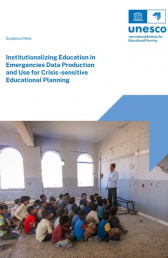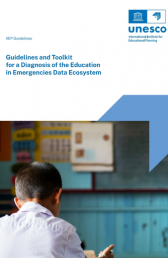
Version en ligne
A propos de la publication
Although the number of countries conducting large-scale assessments has significantly increased over the past two decades, this has not necessarily led to the effective use of learning assessment data in policymaking and planning. To better understand the reasons for this, the UNESCO International Institute for Educational Planning (IIEP) conducted a qualitative study in six sub-Saharan African countries that explored both how they use learning data in the education planning cycle and what influences the use of learning data. IIEP’s research team together with the Assessment Unit of the Ministry of Basic and Secondary Education (MoBSE) conducted an in-depth case study in the Gambia, carrying out data collection in 2018–2019. A number of interviews took place, as well as observations and focus group discussions with actors involved in the production and use of learning data at central and decentralized administrative levels. These were complemented by documentary analysis. Drawing from the research data, this policy brief explores the main lessons for national policy-makers and planners as well as international actors. More information about the study and its methodology can be found at www.iiep.unesco. org/en/our-expertise/use-learningassessment- data-planning.









